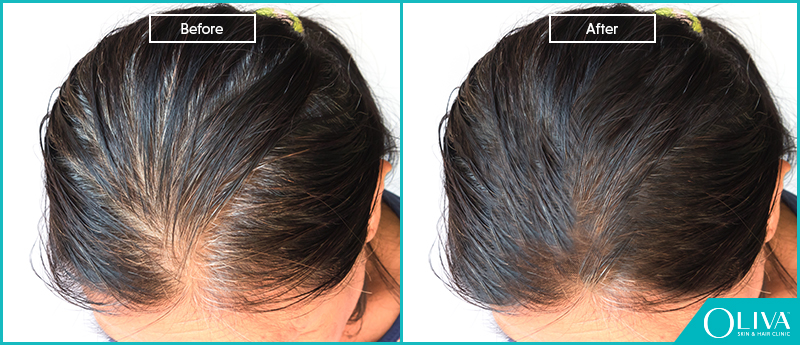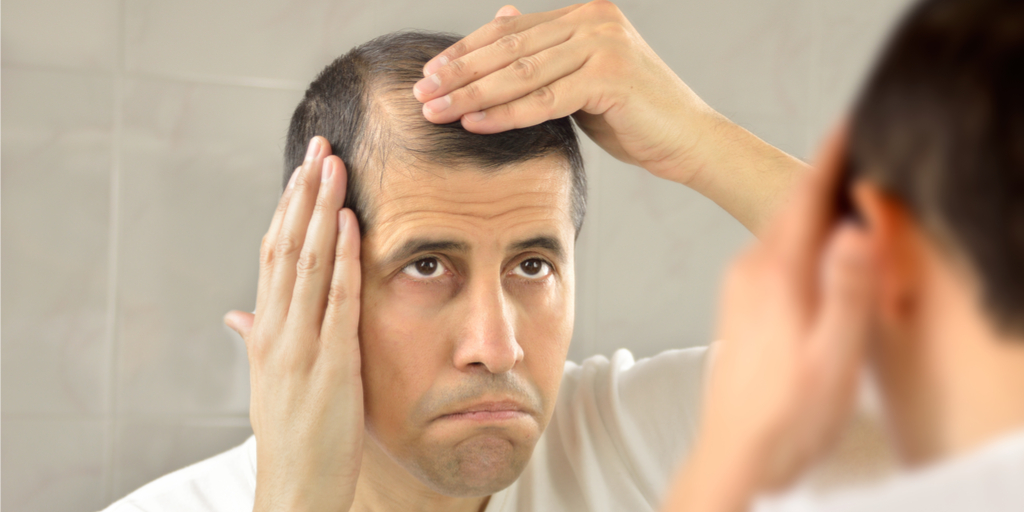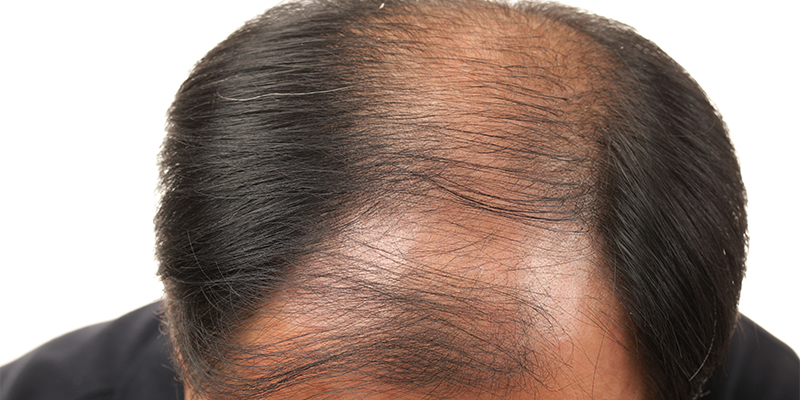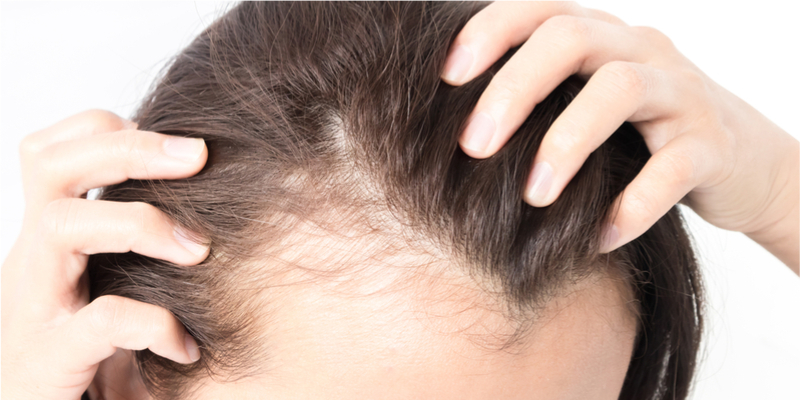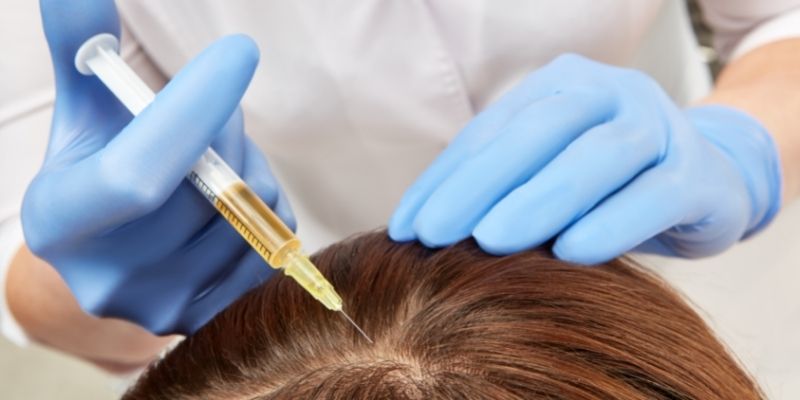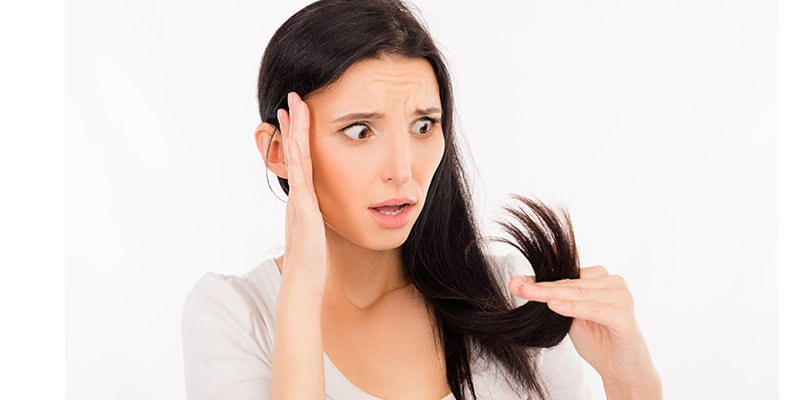Thyroid Condition & Hair Loss – What Can You Do About It?
People often forget hormonal imbalances can be the cause of a long list of issues that do not seem to change with certain treatments. Whether it is fatigue, mood swings or even hair loss, it can all be attributed to issues with one’s hormones. Hair loss linked to thyroid disease is a very common occurrence in women and can also affect men.
In This Article Show
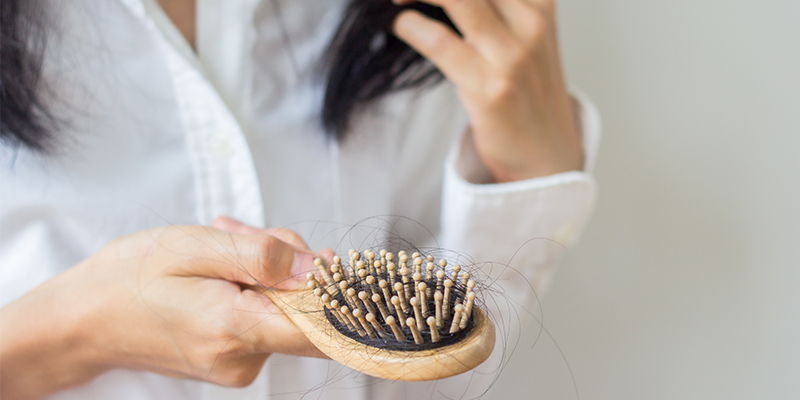
Thyroid Disorder & Hair Loss – What’s The Connection?
Statistics show that in India close to 12 million people annually are affected by thyroid malfunction, of which hair loss is a common symptom.
It has been proven that hair growth is highly dependent on the proper functioning of the thyroid gland. These effects are seen when there is an increase in hair thinning (attributed to hyperthyroidism) or a high rate of hair loss (attributed to hypothyroidism) anywhere on the body.
Common Thyroid Conditions & Hair Fall Issues
The thyroid gland is located along the windpipe and is responsible for producing a hormone that helps with cell reproduction, maintains energy levels, and influences metabolism.
When thyroid levels become imbalanced, the following thyroid diseases can occur –
- Hypothyroidism is a condition with an under-active thyroid gland which can directly be attributed to hair thinning and hair loss if left untreated. An insufficient amount of thyroid hormone is produced which, in turn, compromises the chemical reactions required in the body. It results in a low cell regeneration factor. Low levels of iron and nutritional deficiencies are common factors for hypothyroidism.
- Hyperthyroidism is the overproduction of the thyroid hormone. The body’s metabolism rate increases leading to hair loss, weight loss, irregular heartbeat, sweating, anxiety, and mood swings. This condition is not easily diagnosed due to the generic nature of its symptoms but can eventually be isolated by checking thyroid hormone levels.
Also Read: Hair Loss Treatment
How Thyroid Causes Hair Loss?
To understand the connection of the thyroid gland and hair loss, one must understand the hair cycle. The three stages of growth, resting, and shedding can take place over several months for each strand of hair. Most hair strands are in a state of growth or rest most of the time. When there is a thyroid hormone imbalance, the resting state of hair is extended, and the growth phase is interrupted leading to hair thinning, hair loss or balding in patches.
Hypo or hyperthyroidism is linked to hair loss of varying severity, it can be patchy hair loss such as alopecia areata or a generalized thinning of hair. This causes circular areas of transient hair loss.
Signs & Symptoms Of Hair Loss Due To Thyroid
Other symptoms of a thyroid disorder with respect to hair are –
- Hair thinning
- Hair loss
- Itchy and dry scalp
- Dry and/or damaged hair
Also Read: Symptoms & Treatments Of PCOS Hair Loss
What To Do For Hair Loss Due To Thyroid?
Hair loss due to thyroid imbalances can be reversed (if treated in time) with any treatment that normalizes the hormone levels. The first step is to consult a medical professional. Typically the follow up to this is to get a full thyroid panel to determine your thyroid hormone levels. A full thyroid panel will provide information towards TSH, Free T4 (FT4), Free T3 (FT3), and Reverse T3 (RT3) which in a more detailed diagnosis.
Depending on the test results, your doctor will prescribe a specific type of hormonal supplement in a customized dose.
As with most ailments, managing your diet is vital. Removing toxic or inflammatory foods will help normalize hormone levels and improve hair health. Consuming whole foods rich in iodine, selenium, zinc, iron, and vitamins A, B, C, and D will regulate hormones and help with thyroid disorders. Increase your protein-rich food consumption and manage the intake of carbohydrates to help counter the effects of a slow metabolism due to a thyroid disorder.
Adding iron (ferritin), protein (collagen), and multivitamin supplements will help with nutrient levels, reverse hair loss, and improve hair strength in addition to skin elasticity and stomach health.
Particularly in women, managing testosterone and androgen levels with prescribed methods (e.g., birth control pills) can, in turn, help tackle the effects of hair loss due to a thyroid imbalance.
Also Read: How To Treat Alopecia Areata?
How To Stop Losing Hair Due To Thyroid?
- Understand the types of hair loss – General shedding is experienced with compromised thyroid function. There is also male pattern baldness or female pattern baldness (androgenetic alopecia) and alopecia areata seen, that can be caused by hormonal imbalances and genetics.
- Consult a dermatologist – In combination with a general physician or an endocrinologist, a dermatologist can be an effective support for hair loss issues. They can focus on issues with hair loss and treat them independently (without interfering) with regular thyroid disease treatments.
- PRP (Platelet Rich Plasma) treatment for hair loss – Hyperthyroidism decreases overall blood flow reducing the supply to the hair follicles causing hair loss. PRP treatment is an advanced treatment for hair loss where blood is extracted from patients own body and is put to centrifuge. This is a US FDA approved machine to separate the activated platelets from plasma, which is then injected back into scanty areas of hair growth on the scalp. This adds growth factors into the hair follicles, stimulating them for restoration and regrowth of hair. Results have shown a decreased rate of hair loss and hair thinning. Hair shafts can also grow back thicker helping the overall aesthetic of the hair on your scalp.
Also Read: Cost Of PRP Hair Treatment
- Avoid goitrogenic food – Goitrogens interfere with the iodine absorption by the thyroid gland and disrupts thyroid hormone production. Follow your doctor’s advice on a diet plan such as cabbage, cauliflower, broccoli, radish, etc. that helps counter the effects of thyroidism and manage your hair loss issues.
- Prevent Vitamin D deficiency – Supplements may be prescribed by your doctor and additionally expose yourself to the sun for up to thirty minutes or ingest vitamin D through fortified foods to help with hair growth.
- Balance your blood sugar – Our sedentary lifestyles combined with our high consumption of carbohydrate rich comfort food causes our blood sugar to go haywire. Irregular sugar levels with thyroid disruption is a major factor for hair loss and other issues like obesity and mood swings. Increase your protein consumption and reduce excess carbohydrates to keep your sugar level and your hair loss issues in check.
Also Read: How To Prevent Hair Loss Effectively?
- Address adrenaline – Excess production of adrenaline due to chronic stress can affect major metabolic processes kept in check by the thyroid gland. Key functions like blood pressure regulation, electrolyte levels, blood sugar, immune function, and digestion can all be disrupted. Hair thinning and hair loss are side effects associated with thyroid imbalances and can be deadly in the long term. De-stress with some yoga, meditation, basic exercises or creative hobbies to have a constructive outlet for your mind and body.
Before And After Results
Hair loss due to thyroid disease is treatable and in most cases reversible. The key is early diagnosis and the right kind of lifestyle changes to help correct the issue. Meet with a medical professional, modify your diet, and try to reduce the stress levels to get on to the road to recovery.
Frequently Asked Questions On Thyroid Condition & Hair Loss
In most cases, hair loss caused by a thyroid disorder is temporary and will improve once the condition is properly managed with medication. However, it can take several months for hair to regrow
Hair loss from thyroid issues is often a diffuse thinning across the entire scalp, rather than in specific patches. It’s usually accompanied by other symptoms of a thyroid disorder, such as fatigue, weight changes, or mood swings. A doctor can confirm the cause with a blood test.
While it’s a common concern, thyroid medication is rarely the direct cause of hair loss. It may seem like hair loss is worsening after starting treatment, but this is often due to the long hair growth cycle. The shedding you notice may be a result of the thyroid problem that was present months earlier.
The thyroid produces hormones (T3 and T4) that are essential for the body’s metabolic functions, including the regulation of hair follicles. An imbalance in these hormones can disrupt the normal hair growth cycle, causing hair to become brittle, thin, and shed more easily.
The most important step is to work with your doctor to get your thyroid hormone levels balanced through medication. Additionally, maintaining a healthy lifestyle, managing stress, and ensuring you have adequate levels of key nutrients like iron and zinc can support hair regrowth.


